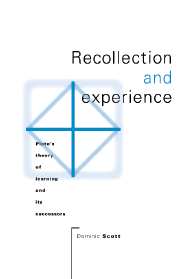Book contents
- Frontmatter
- Contents
- Acknowledgements
- Abbreviations
- GENERAL INTRODUCTION
- SECTION I PLATONIC RECOLLECTION
- Introduction
- 1 The Meno
- 2 Recollection in the middle period
- SECTION II ARISTOTELIAN EXPERIENCE
- SECTION III HELLENISTIC CONCEPTS
- SECTION IV INNATISM IN THE SEVENTEENTH CENTURY
- CONCLUSION
- Bibliography
- Index of ancient passages
- General index
1 - The Meno
Published online by Cambridge University Press: 03 December 2009
- Frontmatter
- Contents
- Acknowledgements
- Abbreviations
- GENERAL INTRODUCTION
- SECTION I PLATONIC RECOLLECTION
- Introduction
- 1 The Meno
- 2 Recollection in the middle period
- SECTION II ARISTOTELIAN EXPERIENCE
- SECTION III HELLENISTIC CONCEPTS
- SECTION IV INNATISM IN THE SEVENTEENTH CENTURY
- CONCLUSION
- Bibliography
- Index of ancient passages
- General index
Summary
The first two parts of this chapter will focus specifically on the question of whether Plato shows any interest in ordinary learning in the Meno, In [1] I shall tackle this question by examining Meno's paradox (8od5–e5), the problem that provokes Socrates into proposing recollection in the first place. Is this a problem about ordinary learning, higher learning or both? In [2] I shall look at the initial statement of the theory and at the examination of the slave boy (81c5–85d1) to see if recollection is actually used to explain ordinary concept formation. In both [1] and [2] I shall argue that there is no evidence that the theory was meant to explain such learning. Finally, in [3], I shall look at the second half of the dialogue and argue that, although it would be unwise to press for a fully determinate version of the Demaratus interpretation in these pages, we can find it in an embryonic form. Recollection is used to account for philosophical discovery that results in knowledge; but Plato also draws our attention to the existence of a certain class of true beliefs which are not formed by recollection, even partial recollection, but derive from a kind of surrogate for perception – hearsay or tradition.
MENO'S PARADOX
The dialogue opens with Meno asking Socrates whether virtue is acquired by teaching, practice or nature. In reply, Socrates professes himself to be unable to answer the question. So far from knowing what virtue is like, he does not even know what it is (71a5–7).
- Type
- Chapter
- Information
- Recollection and ExperiencePlato's Theory of Learning and its Successors, pp. 24 - 52Publisher: Cambridge University PressPrint publication year: 1995
- 1
- Cited by



